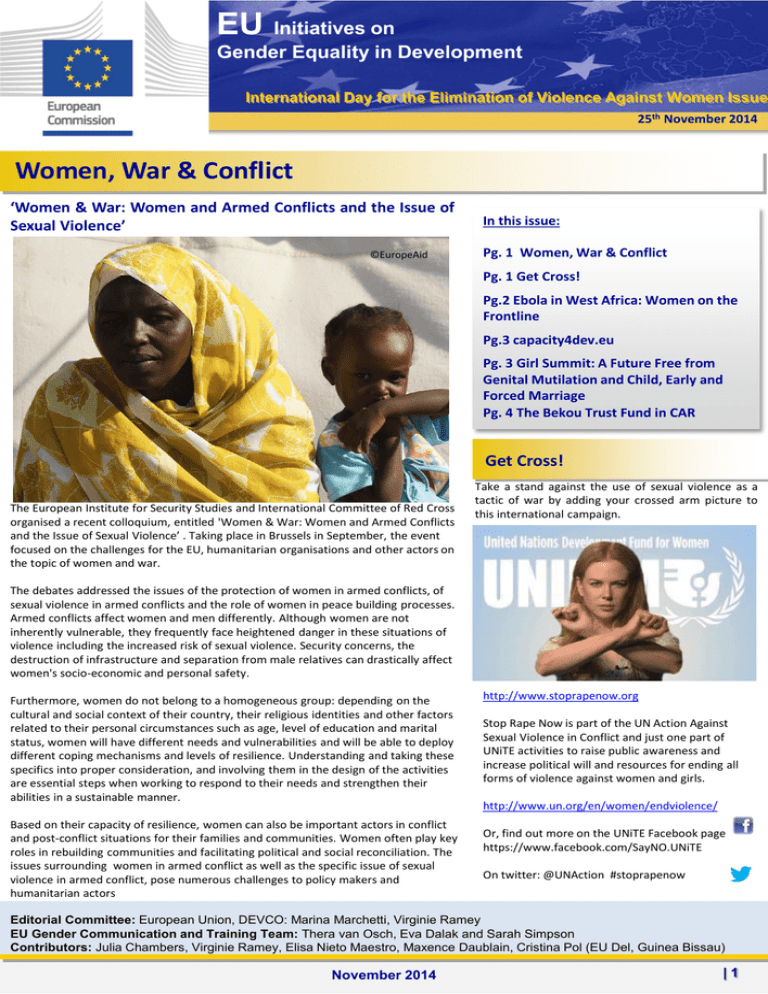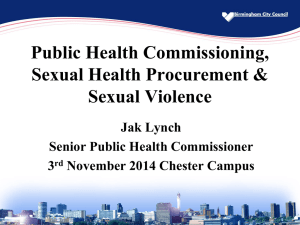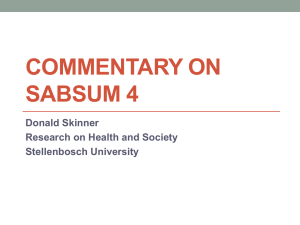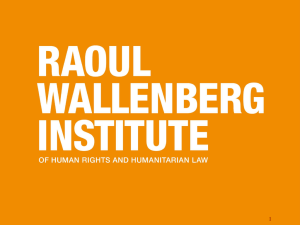
EU Initiatives on
Gender Equality in Development
International Day for the Elimination of Violence Against Women Issue
25th November 2014
Women, War & Conflict
‘Women & War: Women and Armed Conflicts and the Issue of
Sexual Violence’
©EuropeAid
In this issue:
Pg. 1 Women, War & Conflict
Pg. 1 Get Cross!
Pg.2 Ebola in West Africa: Women on the
Frontline
Pg.3 capacity4dev.eu
Pg. 3 Girl Summit: A Future Free from
Genital Mutilation and Child, Early and
Forced Marriage
Pg. 4 The Bekou Trust Fund in CAR
Get Cross!
The European Institute for Security Studies and International Committee of Red Cross
organised a recent colloquium, entitled 'Women & War: Women and Armed Conflicts
and the Issue of Sexual Violence’ . Taking place in Brussels in September, the event
focused on the challenges for the EU, humanitarian organisations and other actors on
the topic of women and war.
Take a stand against the use of sexual violence as a
tactic of war by adding your crossed arm picture to
this international campaign.
The debates addressed the issues of the protection of women in armed conflicts, of
sexual violence in armed conflicts and the role of women in peace building processes.
Armed conflicts affect women and men differently. Although women are not
inherently vulnerable, they frequently face heightened danger in these situations of
violence including the increased risk of sexual violence. Security concerns, the
destruction of infrastructure and separation from male relatives can drastically affect
women's socio-economic and personal safety.
Furthermore, women do not belong to a homogeneous group: depending on the
cultural and social context of their country, their religious identities and other factors
related to their personal circumstances such as age, level of education and marital
status, women will have different needs and vulnerabilities and will be able to deploy
different coping mechanisms and levels of resilience. Understanding and taking these
specifics into proper consideration, and involving them in the design of the activities
are essential steps when working to respond to their needs and strengthen their
abilities in a sustainable manner.
Based on their capacity of resilience, women can also be important actors in conflict
and post-conflict situations for their families and communities. Women often play key
roles in rebuilding communities and facilitating political and social reconciliation. The
issues surrounding women in armed conflict as well as the specific issue of sexual
violence in armed conflict, pose numerous challenges to policy makers and
humanitarian actors
http://www.stoprapenow.org
Stop Rape Now is part of the UN Action Against
Sexual Violence in Conflict and just one part of
UNiTE activities to raise public awareness and
increase political will and resources for ending all
forms of violence against women and girls.
http://www.un.org/en/women/endviolence/
Or, find out more on the UNiTE Facebook page
https://www.facebook.com/SayNO.UNiTE
On twitter: @UNAction #stoprapenow
Editorial Committee: European Union, DEVCO: Marina Marchetti, Virginie Ramey
EU Gender Communication and Training Team: Thera van Osch, Eva Dalak and Sarah Simpson
Contributors: Julia Chambers, Virginie Ramey, Elisa Nieto Maestro, Maxence Daublain, Cristina Pol (EU Del, Guinea Bissau)
November 2014
|1
Ebola in West Africa: Women on the Frontline
As the Ebola epidemic continues to rage in West Africa, women are
bearing the brunt of this deadly disease because they care for the
sick, prepare the dead for burial and conduct much of the crossborder trade in the region.
Tens of thousands have died in this Ebola outbreak. But women tend
to be disproportionately affected, accounting for 55 to 60 percent of
deaths in the current epidemic in Liberia, Guinea and Sierra Leone,
according to the United Nation’s children’s fund, UNICEF. Some
statistics gathered in Liberia calculate put the figure as high as 75%.
When a family member falls ill, it’s the women who prepare the food
for the invalid, feed them, clean them, wash their clothes or bathe
them. Traditionally, in this region older women prepare bodies for
funerals, washing and cleansing the corpse ahead of burial. And petty
trade, which is an economic mainstay in the region and mostly
conducted by women, increases their exposure and transmission of
the disease.
On 17
September, 150
adolescent girls
trained by
UNICEF and
implementing
partners
marched across
West Point
community in
Monrovia to
launch
©UNICEF Liberia/2014/Cgriggers Adolescents
Leading the
Intensive Fight against Ebola, or ‘A-LIFE’. Equipped with awareness materials,
these girls are now going from door-to-door in West Point, a densely populated
lower-income urban community, to educate their parents, family members and
friends about Ebola and how it can be prevented.
Gender and the post-2015 Development
Agenda
Similarly, nurses and cleaners in hospitals are more likely to be
women than men. And they are less likely to be provided the
protective clothing and other equipment than the doctors they work
alongside.
Over 140 leaders from around the world, along with representatives
from UN agencies and civil society and women’s organizations, came
Such roles heighten women’s risk of infection with the Ebola virus,
together on 22 September for a Special Session of the General
which spreads through direct contact with bodily fluids like blood,
Assembly on the Follow-up to the Programme of Action of the
urine, faeces and vomit.
International Conference on Population and Development beyond
2014.
In some instances, women are being targeted in a bid to contain the
spread of this disease, which has killed tens of thousands of people in The UN General Assembly Special Session reviewed progress on
this outbreak alone and still shows no signs of abating.
commitments made 20 years ago at the International Conference on
Population and Development (ICPD), held in Cairo in 1994. That
A special task force set up by the government of Liberia is enlisting
gathering affirmed the close links between sustainable development,
women to spread information through their communities about how reproductive health and gender equality.
the disease is spread and simple steps that can be taken to protect
against infection.
"As we celebrate the twentieth anniversary of the Cairo Conference and
look ahead to the future, we cannot afford to short-change
But the negative affects of Ebola on women aren’t limited to a
development," said Ban Ki-moon, Secretary-General of the United
heightened risk of infection.
Nations, as he opened the Assembly’s special session.
Sierra Leone has one of the highest maternal mortality rates in the
world. Some 890 Sierra Leonean women die for every 100,000 live
births, according to the UN, compared to 370 per 100,000 live births
in nearby Senegal or 8 per 100,000 live births in Belgium.
Senior Government officials from 90 countries participated in the
session. Overall, they agreed that population concerns must be at the
core of the post-2015 development agenda and cited the need for
universal access to basic services such as health care and
education. They shared respective national trends in maternal and
Sierra Leone and its partners have made a great push to improve
infant mortality, fertility, contraceptive use, ageing and HIV/AIDS
maternal health and survival rates, notably by encouraging women to prevalence, as well as programmes for family planning and sex
go to hospital to have their babies.
education, among other areas.
But the Ebola outbreak has closed many health facilities in the region
to all admissions other than Ebola-related cases. Newspapers carry
reports of pregnant women dying in taxis as they are unable to access
hospital services in a difficult labour. In other cases, women are too
scared of Ebola infection to go near a hospital or clinic to deliver their
baby.
With no end in sight to the current outbreak, Ebola looks set to
continue to take a heavy toll on the populations and especially the
women of Guinea, Liberia and Sierra Leone.
Several speakers voiced strong support for sexual and reproductive
rights, and representatives from developing countries appealed for
reliable financial and technical aid to implement their respective
sustainable development agendas.
The European Union and its Member States highlighted the fact that
"we cannot expect progress in development unless human rights,
women's empowerment and gender equality are upheld as essential
preconditions for equitable and inclusive sustainable development".
With the Cairo Programme of Action as its guide, the international
community must confront challenges caused by rising inequality,
urbanization, migration, population ageing and the largest generation
of young people in history, as well as hammer out…. (continued page 3)
November 2014
|2
Gender and the post-2015 Development
Agenda (continued)
An ambitious post-2015 development path and a meaningful climate
change agreement before the end of next year. "As we advance on all
these fronts, we have to remember the vision of Cairo, especially the
priority it placed on reproductive health," said Ban Ki-moon.
Keep up to date with latest news, events, reports and publications
by visiting your dedicated Public Group on Gender on the
European Commission’s capacity development and knowledge
sharing site, capacity4dev.eu.
The EU statement moved on the same direction, stressing that
"universal access to comprehensive sexual and reproductive health,
provided inter alia through integrated quality health care, is one of the
highest priorities for the global agenda beyond 2014 and is essential to
sustainable development and poverty eradication".
Are you marking International Day for the Elimination of Violence
Against Women with a special event? If so, we’d love to know
more, please share details and photographs online.
http://capacity4dev.ec.europa.eu/public-gender/
Girl Summit: A Future Free from Genital Mutilation and Child, Early and Forced Marriage
A woman in Salbal Village, Sudan @EuropeAid
©EuropeAid
This summit, organised by the UK, brought together community leaders,
the private sector, approximately 50 governments and numerous
international organisations to build on current efforts and rally a global
movement to end Female Genital Mutilation (FGM) and Child, Early and
Forced Marriage (CEFM) in a generation, everywhere, forever.
The EU insisted on its efforts to implement the Action Plan towards
the elimination of female genital mutilation both within the EU and
globally with a particular focus on prevention. FGM and CEFM will be
raised in the political and human rights dialogues with relevant
partner countries, where these practices still exist, and launch a
global diplomatic outreach on violence against children with a
specific focus on those two traditional harmful practices.
It built on the activities of many developing countries where
governments and local communities are already tackling these practices
Inside the EU 28 Member States, the EU will develop e-learning
as well as the major work being done by international and local
modules for professionals working with those affected by or at risk of
organisations.
FGM.
Millions of women and girls are being prevented from achieving their
Finally, € 4.5 million will be invested for EU Member States'
potential as a result of FGM and CEFM, however a positive trend is
being witnessed across Africa, Europe, the Middle East and South Asia, awareness-raising campaigns on violence against women, including
FGM, as well as projects led by grassroots organisations aimed at
as opposition to these practices grows.
combating FGM and other harmful practices.
The European Union participated to this Summit in order to get behind,
support and accelerate internationals efforts to end FGM and CEFM and In order to track and promote progress on commitments, the event
organiser -UK government – indicated that those commitments will
was represented by its Special Representative for Human Rights, Mr
be time-bound and tracking will be continued on an annual basis for
Stavros Lambrinidis.
the length of the timeframe of the commitments.
The outcome document of the Summit, "The Girl Summit Charter on
The first web-based annual update will be published in July 2015. The
Ending FGM and Child, Early and Forced Marriage", was accompanied
by individual commitments made by governments, international bodies global process for tracking progress on commitments made during
and after the Girl Summit 2014 will promote country ownership and
and NGOs. Some 9 of the 20 governments that signed the Charter are
mutual accountability; recognise and promote progress; and be
on the list of countries in which FGM has been documented as a
integrated into existing mechanisms on FGM/C and CEFM.
traditional practice: Burkina Faso, Ethiopia, Ghana, Guinea, Guinea
Bissau, Kenya, Senegal, Somalia and Yemen.
For further information on the individual commitments expressed
visit during the Girl Summit 2014:
The EU has committed more than € 100 million for the next 7 years to
gender equality and child -wellbeing under its funding instruments and https://www.girlsummit2014.org/Commitment/Show
the newly established Global Public Goods and Challenges programme. https://www.gov.uk/government/topical-events/girl-summit-2014
November 2014
|3
The Bekou Trust Fund: Supporting the economic recovery of women and girls in CAR
"Women and girls
suffer sexual
violence, personal
insecurity and
displacement
associated with
conflict, [and] the
women of CAR are
among the worst
affected by poverty"
http://genderindex.
org/country/central
-african-republic
©EuropeAid
The European Commission, Germany, France and the Netherlands has
set up the first European Union Trust Fund; the aim of which is to
promote the stabilisation and reconstruction of the Central African
Republic (CAR).
The Fund has been named Bêkou, which means 'hope' in Sango, a
local language. It aims to avoid a fragmentation of aid and support,
and to lead to a more effective and efficient approach to
development by the international community.
government of CAR, the Bekou Trust Fund has made women's
economic empowerment a priority over the next two years.
In addition to mainstreaming gender across its work, the Fund
will support a project targeted at supporting women and girl's
economic empowerment in CAR. The complex context and
multitude of interrelated social, cultural and political issues and
challenges call for a comprehensive approach to seeking to
improve gender equality and women's empowerment in CAR.
Since independence in 1960, CAR has suffered ongoing political
turmoil, civil unrest and armed conflict. Instability in neighbouring
countries also affects the country. Recent tensions reached crisis point
in 2013. Towns are often divided along ethnic or religious lines and
violence can be a daily occurrence due to militias, the availability of
small arms, the breakdown of the country's social and economic fabric
and to the weak capacity of those institutions that could otherwise
attempt to mediate or mitigate emerging conflict.
The project will take on a holistic approach to women's economic
empowerment by providing basic services, life skills training and
access to economic assets, where feasible. It will do so in a way
that also engages the wider community and seeks to challenge
social norms.
Women and girls suffer disproportionately from the crisis.
In addition to their daily struggle for subsistence, poor women and
girls in CAR are routinely targeted and face physical and sexual
violence in their homes and communities. They are extremely
vulnerable to rape, abduction, sexual exploitation and abuse.
For further information visit:
http://ec.europa.eu/europeaid/subsites/trust-fund-bekou_en
The enabling environment for their economic and social
empowerment is extremely challenging. Though CAR has ratified
CEDAW and its 2004 constitution affirms the equality of human beings
before the law, it still has a number of discriminatory laws and
customary practices.
Given the current situation in CAR and the pressing needs of women
and girls, and given the strong political will demonstrated by the
The project is being designed to ensure that it applies itself to the
current social, political and economic context of the country.
The EU Delegation in Guinea Bissau is supporting a number of
activities to combat violence against women and end female
genital mutilation.
Read more on capacity4dev.eu:
http://capacity4dev.ec.europa.eu/public-gender/blog/eudelegation-gender-activities-guinea-bissau
Want to tell colleagues about your activities? Sign up and
share on capacity4dev.eu
November 2014
|4









